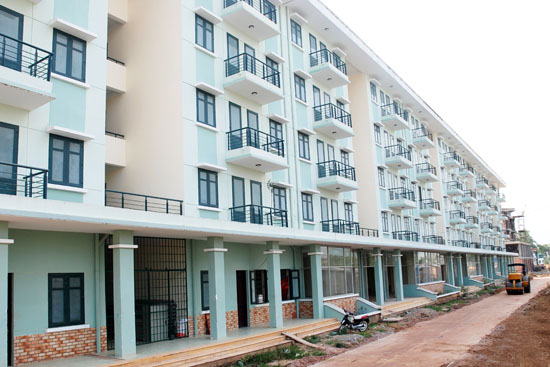Corporate Income Tax is a direct tax that is levied directly on taxable income and is a tax that assesses the efficiency of a business's production and operations. Therefore, a reasonable tax policy will bring benefits to both businesses and the state budget (NSNN).
Corporate Income Tax

Illustrative image (source: internet)
Applying a separate tax rate for small and medium-sized enterprises is a breakthrough in the draft Amended Corporate Income Tax (CIT) Law that the Government of Vietnam presents to the National Assembly this time.
Corporate Income Tax is a direct tax that directly regulates the taxable income of enterprises and is a tax that assesses the business efficiency of enterprises. Therefore, a reasonable, clear, transparent, and effective tax policy is very important in promoting business development, enhancing accounting, and bringing benefits to both enterprises and the State Budget (NSNN).
One of the requirements of enterprises, especially foreign-invested enterprises, is to operate in a unified, clear, and transparent legal environment. The amendment of the CIT Law this time must aim to promote the advantages of the current Law and gradually overcome the limitations and deficiencies of the Law affecting the business development of enterprises. The amendment of the Law must also comply with the tax system reform strategy for the period 2011-2020 approved by the Prime Minister of the Government of Vietnam under Decision No. 732/QD-TTg dated May 17, 2011.
So will the Law amending some articles of the CIT Law that the Government of Vietnam will present to the National Assembly this session address the above requirements and bring expectations to the business community?
Enabling Enterprises to Accumulate Capital for Expanding Production
The CIT rate reflects the regulation ratio of the NSNN and enterprises on the profit (taxable income) generated by enterprises. Normally, the profit is divided into 3 parts and shared according to the ratio: leaving two parts to the enterprise, and paying one part to the NSNN.
The CIT Law of 1997 that took effect from January 1, 1999, had a tax rate of 32%; the CIT Law of 2003 that took effect from January 1, 2004, adjusted to reduce by 4%: from 32% down to 28%; the CIT Law of 2008 that took effect from January 1, 2009, adjusted to reduce by 3%: from 28% to 25% uniformly applicable to all types of enterprises.
According to the draft this time, CIT will be deeply reduced according to a roadmap and applied separately to small and medium-sized enterprises. Specifically, the basic tax rate applicable from January 1, 2014, will be reduced by 3%: from 25% down to 22%, from January 1, 2016, will continue to be reduced from 22% down to 20%. Meanwhile, the tax rate for small and medium-sized enterprises from January 1, 2014, will be reduced from 25% down to 20%, from January 1, 2016, will continue to be reduced from 20% down to 17%.
Reducing the CIT rate will decrease the NSNN revenue by about VND 20,000 billion. However, this reduction will correspondingly increase the capital of enterprises. Enterprises will have more financial resources to expand their business operations, reduce loan interest expenses, lower production costs, and improve competitiveness, attracting investment compared to countries in the region.
Applying a separate tax rate for small and medium-sized enterprises is a breakthrough in the amended CIT Law that the Government of Vietnam presents to the National Assembly this time. Although there are still concerns about the criteria and thresholds for determining small and medium-sized enterprises, applying a separate, lower tax rate shows the special interest of the State in this subject, aiming to enable enterprises to accumulate more capital, continue to expand, and develop business production.
Expanding Preferential CIT Scope
The draft amended Law specifies additional sectors and industries that will enjoy preferential tax rates, such as private investment in housing projects, publishing activities, journalism... Additionally, this draft amended Law allows preferential CIT for expanded investments of enterprises.
Accordingly, the CIT Law of 1997 that took effect from January 1, 1999, and the CIT Law of 2003 that took effect from January 1, 2004, stipulated that enterprises with expanded investment activities would enjoy preferential treatment for the additional income generated by the expanded investment. But from January 1, 2009, the Corporate Income Tax Law No. 14/2008/QH12 abolished the preferential CIT clause for expanded investment and only applied it to newly established enterprises from investment projects.
Currently, many enterprises are operating with expanded investments in various forms: opening a new production workshop, a new production line, building a new production facility at the same or different locations with independent accounting, establishing a new legal entity, or just a dependent accounting facility...
However, according to the current Law, cases that do not establish new enterprises are not eligible for tax incentives. To enjoy preferential tax rates, enterprises must establish new enterprises, which is costly and difficult to manage, lacks incentives to promote, expands investment, and effectively allocate resources.
Therefore, allowing preferential CIT for expanded investment of enterprises in this amended Law partly meets the expectations of enterprises to have additional capital to invest in installing new production lines, expanding production scale, and innovating business production technologies...
Regarding Deductible and Non-Deductible Expenses
This is the most difficult part and can easily create a lack of transparency in the CIT Law. To be recognized as deductible expenses when calculating CIT, expenses must meet the following conditions: Actual expenses incurred related to the business activities of the enterprise and have legal invoices and documents as prescribed by law, and those expenses are not among the non-deductible expenses specified in Clause 2, Article 9 of the CIT Law.
In practice, applying this regulation is not easy for corporate accounting. There are expenses that actually arise and have legal invoices and documents, considered by the enterprise to be related to its business activities, but the management agency may consider them unrelated. Additionally, some expense regulations, aside from meeting the above principles, must undergo a registration notification procedure to the tax authority to be eligible for deduction.
For example, the regulation: "The portion of raw materials, materials, fuel, energy, goods costs exceeding the consumption norm set by the enterprise and notified to the tax authority" will not be deductible when calculating CIT. In practice, these regulations are not practical in management and increase costs for society: enterprises spend a lot of time informing the tax authority about the consumption norm of raw materials set by themselves, the tax authority rarely uses this data, but if not informed, it will not be accepted as an actual expense... This time, the draft Law proposes to abolish the non-deductible expense regulation for raw material, material, fuel, energy, goods costs exceeding the consumption norm. This regulation has received high consensus from the business community.
Additionally, expenses on advertising, marketing, promotion, brokerage commissions, receptions, hospitality, conferences, marketing support, cost support... are also reviewed to suit the reality and increase the expense limit on advertising, promotion to 15% for all types of enterprises, regardless of newly established enterprises.
Furthermore, some expenses such as sponsorship, contributions to the voluntary pension fund, or social security funds for employees, the regulation on "thin capitalization" (interest expenses on loans) are also studied to be amended and supplemented to expand the deductible expenses to reflect the actual incurred expenses closer to those for calculating CIT.
Hopefully, the amended and supplemented CIT Law will be passed by the National Assembly to meet the expectations of enterprises. Reducing the CIT rate and expanding some deductible expenses will initially affect NSNN revenue. However, it is believed that the reduced tax amount will be effectively used by enterprises, contributing to expanding business production, creating more material wealth for society, and contributing to the NSNN in subsequent business cycles.
Source: Baochinhphu.vn
 Article table of contents
Article table of contents





.Medium.png)
.Medium.png)
.Medium.png)
.Medium.png)
